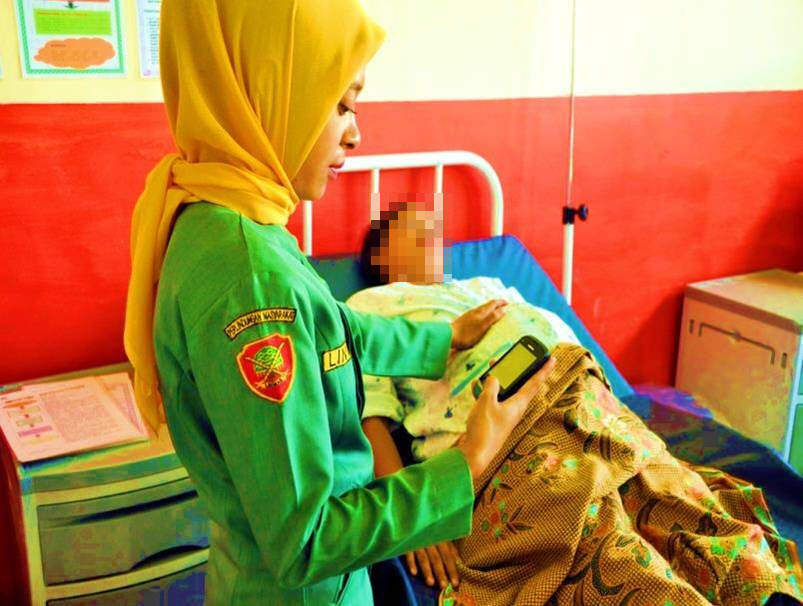Referring patients

JAKARTA, Indonesia — Since October 2012, the Sistem Informasi Jejaring Rujukan Maternal & Neonatal (SIJARIEMAS) application has supported more than 12,000 obstetric and newborn referral cases in Indonesia. Today, SIJARIEMAS connects more than 13,000 health providers and 700 health facilities to provide an efficient and thorough referral process and enable hospitals to prepare for incoming emergency cases.
RTI International led development of the SIJARIEAMAS application as part of the Expanding Maternal and Neonatal Survival (EMAS) program, funded by the U.S. Agency for International Development (USAID). EMAS strives to reduce maternal and newborn mortality rates across six Indonesian provinces.
SIJARIEMAS contributes to this effort by networking health center-based midwives with local hospitals. Using Short Message Service (SMS) and phone calls, the midwives quickly relay patient data, vital signs, diagnoses, and pre-treatment information to hospitals in the event of an obstetric or newborn emergency. SIJARIEMAS automatically routes this information to the nearest hospital. Upon receiving notification, an alarm is triggered in the hospital emergency room or in a maternity or newborn ward.
Staff at the hospital assess whether they are able to treat the patient—based on factors such as bed availability, blood supply, specialists on duty, and clinical equipment—and either accept or reject the referral. If accepted, the referral notification is automatically forwarded to the emergency team. If rejected, the system routes the message to the next pre-defined closest hospital.
The midwife of the referred patient is kept apprised on the patient’s status and alerted with follow-up guidance after discharge, again via SMS. The SIJARIEMAS application includes user dashboards to manage and track the referral process.
Improved Maternal and Neonatal Emergency Referrals
Prior to EMAS, there was no formally defined referral pathway, and the referral process faced delays that led to increased morbidity and mortality. Through EMAS and the deployment of the SIJARIEAMAS application, 23 districts in the 6-province target region now have standard operating procedures for referrals and the tools and training needed to execute those procedures.
During an 8-month period from October 2013 to May 2014, SIJARIEMAS facilitated 2,102 maternal and neonatal referral cases out of a total of 3,975 referral cases, representing 53 percent of all referrals.
Project data also indicate that, through SIJARIEMAS, 91 percent of referrals were acknowledged (and ready to receive referral) by district hospitals in less than 10 minutes—a huge improvement as most health facilities had no effective communication system in place prior to SIJARIEMAS implementation. Additionally, District Health Offices (DHOs) now have all referral data in real time, which allows them to quickly identify trends and make necessary adjustments.
Drg. Devi, the head of the DHO in Bogor District, said that SIJARIEMAS has enabled a much speedier referral process compared to when they had no formal system in place. The implementation of SIJARIEMAS in Bogor District was supported by local government funds that covered equipment, network, operational, and human resources costs, including salaries of eight call center operators. With further government funding in place, the DHO is planning to expand the use of SIJARIEMAS in 2014 to cover all remaining health centers.
At a district-level referral system workshop conducted in Karawang in April 2014, other DHOs from across several districts reported that, because of SIJARIEMAS, they can now track referrals, identify where there are delays in the system, and understand the reasons for specific delays. The DHOS concurred that this real-time information gives them the ability to assess and improve the overall district health system.
A Collaborative Effort
Development of SIJARIEMAS began in 2011 with a user needs assessment, stakeholder interviews, and an expert workshop. SIJARIEAMAS was developed using open-source software and designed to be integrated with existing systems in Indonesia.
The beta version of SIJARIEMAS was released in October 2012, and full-scale rollout occurred between November and December 2012. RTI led the development, in collaboration with EMAS partners Jhpiego (prime), the Health Institute of Budi Kemuliaan, Muhammadiyah, and Save the Children.
Implementation, like design, is a collaborative process. EMAS provides the software and technical assistance, the DHOs are responsible for policies and oversight of operation and monitoring, and the hospitals provide hardware and manage operations within their own facilities.
Articles and Publications
- Nyawa di Ujung Jari - SIJARIEMAS in Action, Banten, Serang (video, English, Indonesian)
- SIJARIEMAS tutorial screencast (video screencast, Indonesian)
- Implementation (video, Indonesian)
- SIJARIEMAS overview (video, Indonesian)
- Login to post comments
- Printer-friendly version
 PDF version
PDF version

